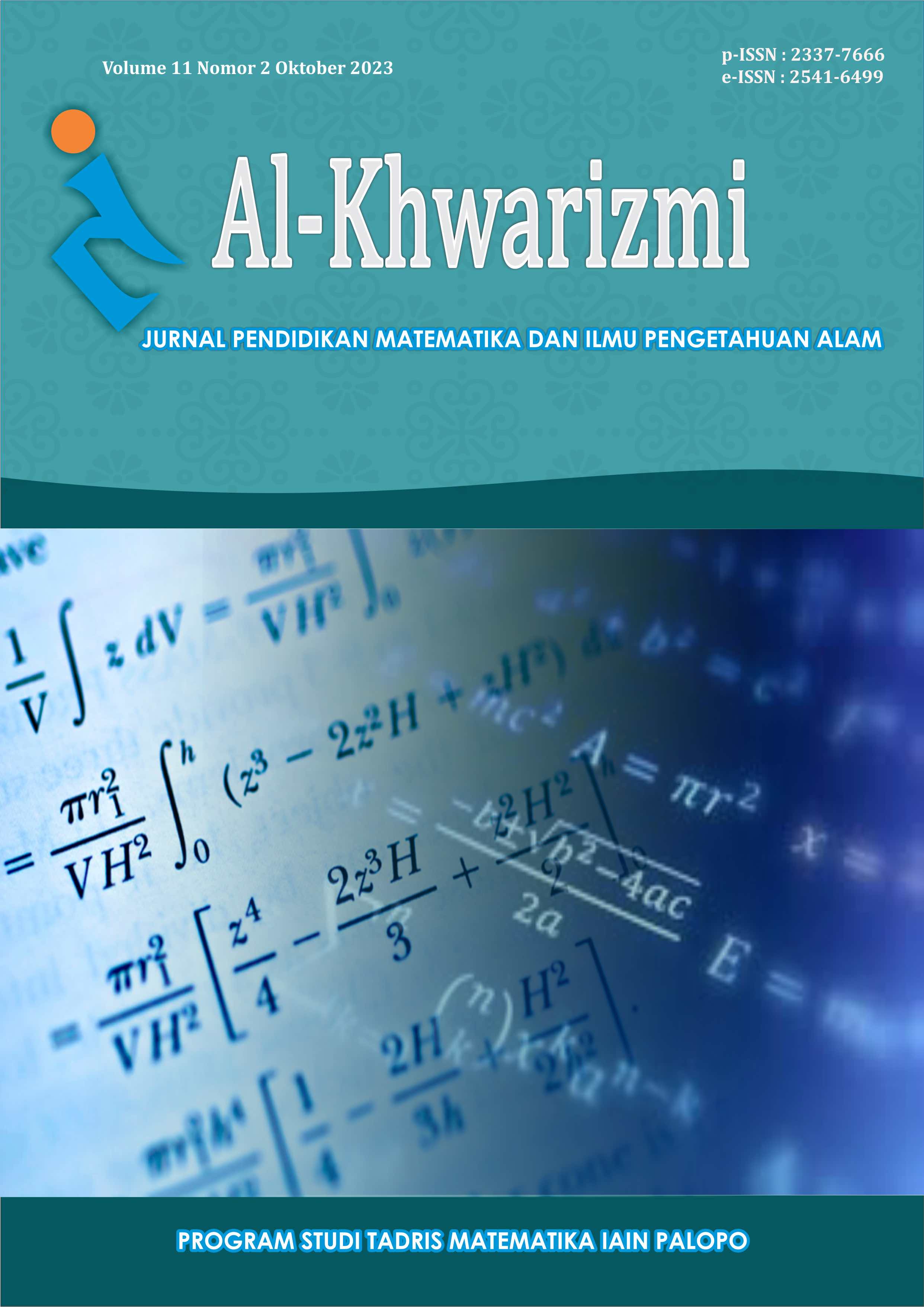Design of Mathematics Learning Framework Based on the Perspective of the Qur'an
DOI:
https://doi.org/10.24256/jpmipa.v11i2.2976Keywords:
Al-Qur'an Perspective, Learning Framework Design, Mathematics Learning.Abstract
Abstract:
The concept of inspiring, communicative, and interesting learning based on verses of the Qur'an is expected to be able to foster children's joy in learning mathematics. This is literature research that analyzes and describes the design of a mathematical learning framework based on the perspective of the Qur'an. Research data sources consist of references or literature related to mathematics learning from the perspective of the Qur'an, mainly focused on algebraic concepts such as numbers, various numbers, and number operations. In addition, one expert in the interpretation of the Qur'an was involved as a source of data. Data analysis using content analysis techniques. The results showed that in the Qur'an, various mathematical concepts provide an overview of algebra, namely about numbers, various numbers, and number operations. In addition, there are also various learning activities, including the preparation, implementation, and evaluation stages of learning activities.
Abstrak:
Konsep pembelajaran yang inspiratif, komunikatif dan menarik yang bersumberkan pada ayat-ayat Al-Qur’an diharapkan mampu menumbuhkan rasa suka cita anak-anak terhadap pembelajaran matematika. Penelitian ini merupakan penelitian pustaka yang menganalisis dan mendeskripsikan rancangan kerangka pembelajaran matematika berdasarkan perspektif Al-Qur’an. Sumber data penelitian terdiri dari referensi atau literatur-literatur terkait pembelajaran matematika dalam perspektif Al-Qur’an, terutama difokuskan pada konsep aljabar seperti bilangan, macam-macam bilangan, dan operasi bilangan. Selain itu, satu orang pakar tafsir Al-Qur’an dilibatkan sebagai sumber data. Analisis data menggunakan teknik analisis isi (content analysis). Hasil penelitian menunjukkan di dalam Al-Qur’an terdapat berbagai konsep matematika dan secara jelas memberikan gambaran tentang aljabar yakni mengenai bilangan, macam-macam bilangan, dan operasi bilangan. Selain itu dijumpai juga berbagai kegiatan pembelajaran diantaranya tahap persiapan, pelaksanaan, dan evaluasi kegiatan pembelajaran.
References
Abdussakir. Matematika dalam Al Qur’an. Malang: UIN Maliki Press, 2020. https://malikipress.uin-malang.ac.id/product/matematika-dalam-al-quran/.
Azizah, Alya, Anisa Nabilah, Firda Amalia, Heni Siti Angreini, Indah Permata, Mahfuzhatur Rahmi, and Nor Rizki Agustina. “Pembelajaran Matematika Melalui Perspektif Ayat-Ayat Al-Qur’an.†Religion : Jurnal Agama, Sosial, Dan Budaya 1, no. 1 (April 5, 2023): 55–63. https://doi.org/10.55606/religion.v1i1.46.
Bakar, Wan Norliza Wan. “Mathematic in the Holy Qur’an.†Journal of Academic Minds 5, no. 1 (2011): 53–64. https://darulquran.co.uk/wp-content/uploads/2021/03/Mathematics-in-the-Holy-Quran.pdf.
Cahya, Iis Nilam, and Mohammad Fajar Ahmadi. “Keterpaduan Konsep Operasi Bilangan Matematika Dalam Al-Qur’an.†Prosiding Konferensi Integrasi Interkoneksi Islam Dan Sains 2 (2020): 79–81.
Hamzah, Ali. “Evaluasi Pembelajaran Matematika. Jakarta.†PT Raja Grafindo Persada, 2014.
Maarif, Samsul. “Integrasi Matematika dan Islam dalam Pembelajaran Matematika.†Infinity Journal 4, no. 2 (July 18, 2015): 223–36. https://doi.org/10.22460/infinity.v4i2.p223-236.
Mahdalena, Mahdalena. “Kajian Konsep Bilangan, Bentuk Dan Koneksi Dalam Alquran.†ITQAN: Jurnal Ilmu-Ilmu Kependidikan 9, no. 2 (2018): 1–15. https://ejurnal.iainlhokseumawe.ac.id/index.php/itqan/article/view/215.
Mahmood, Sultan Bashir. The Miraculous Quran A Challenge To Science & Mathematics. Islamabad: Darul Hikmat International, 2000. https://www.urdusoftbooks.com/2014/07/the-miraculous-quran-challenge-to.html.
Noperta, Noperta. “Analisis Konsep Matematika dalam Al-Quran.†Jurnal Equation: Teori dan Penelitian Pendidikan Matematika 6, no. 1 (March 29, 2023): 1–12. https://doi.org/10.29300/equation.v6i1.8433.
Nu’man, Mulin. “Pembelajaran Matematika Dalam Perspektif Alquran.†Jurnal Pendidikan Matematika (JPM) 2, no. 1 (2016): 39–49. http://download.garuda.kemdikbud.go.id/article.php?article=918836&val=14371&title=PEMBELAJARAN%20MATEMATIKA%20DALAM%20PERSPEKTIF%20ALQURAN.
Riana, Riana, and Malik Ibrahim. “LKS Himpunan: Sebuah Pengembangan Matematika Integrasi.†JTAM (Jurnal Teori Dan Aplikasi Matematika) 3, no. 2 (2019): 162–67.
Siregar, Nur, Roslinda Rosli, and Siti Maat. “The Effects of a Discovery Learning Module on Geometry for Improving Students’ Mathematical Reasoning Skills, Communication and Self-Confidence.†International Journal of Learning, Teaching and Educational Research 19 (March 30, 2020): 214–28. https://doi.org/10.26803/ijlter.19.3.12.
Suningsih, Ari, and Hafidz Mufti Abdullah. “Integrasi Ayat-Ayat Bilangan Dalam Al-Qur’an Dengan Nilai-Nilai Islam.†In Prosiding Seminar Nasional Matematika Dan Pendidikan Matematika, 2:101–9. Lampung: Prodi Pendidikan Matematika UIN Raden Intan Lampung, 2019. http://ejournal.radenintan.ac.id/index.php/pspm/article/view/3849.
Downloads
Published
How to Cite
Issue
Section
Citation Check
License
Copyright (c) 2023 Al-Khwarizmi : Jurnal Pendidikan Matematika dan Ilmu Pengetahuan Alam

This work is licensed under a Creative Commons Attribution-ShareAlike 4.0 International License.
Authors who wish to publish and disseminate their papers with the Al-Khwarizmi : Jurnal Pendidikan Matematika dan Ilmu Pengetahuan Alam, shall agree to the publishing rights set by Al-Khwarizmi : Jurnal Pendidikan Matematika dan Ilmu Pengetahuan Alam. Authors understand that they shall assign publication rights as part of the process upon acceptance for publication. The authors agreed that they would transfer certain copyrights to Al-Khwarizmi : Jurnal Pendidikan Matematika dan Ilmu Pengetahuan Alam. Consecutively, authors still retain some rights to use and share their own published articles without written permission from Al-Khwarizmi : Jurnal Pendidikan Matematika dan Ilmu Pengetahuan Alam.
Authors granted Al-Khwarizmi : Jurnal Pendidikan Matematika dan Ilmu Pengetahuan Alam the following rights; (1) the right to publish and provide the manuscripts in all forms and media for publication and dissemination, (2) the authority to enforce the rights in the manuscript, for example in the case of plagiarism or in copyright infringement.
Al-Khwarizmi : Jurnal Pendidikan Matematika dan Ilmu Pengetahuan Alam will follow COPE's Code of Conduct and Best Practice Guidelines for Journal Editors to protect the research results and take allegations of any infringements, plagiarisms, ethical issues, and frauds should those issues arise. The manuscript is attributed as the authors' work, and is properly identified.







